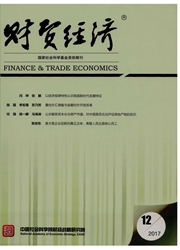

 中文摘要:
中文摘要:
在发展中国家和发达国家分另4具有贸易比较优势和碳减排比较优势的事实下,依次构建了仅发达国家开征碳税、发达国家开征碳关税、发达国家和发展中国家先后开征碳税的博弈模型,从福利效应、贸易效应和环境效应三个方面,先后比较仅发达国家开征碳税与发达国家开征碳关税的效应,以及发达国家开征碳关税与发达国家和发展中国家先后开征碳税的效应。结果表明:发达国家开征碳关税对发达国家有明显的福利效应、贸易效应和环境效应,对发展中国家和全球均有明显的环境效应,对发展中国家的福利效应不明确,没有贸易效应;发展中国家在一定条件下开征碳税对发展中国家有福利效应,有明显的贸易效应,有明显的环境效应的可能性较大,对全球有明显的环境效应的可能性较小,对发达国家有明显的福利效应的可能性较大,没有贸易效应和环境效应。最后为发达国家和发展中国家环境规制政策选择提出了一些建议。
 英文摘要:
英文摘要:
Faced by the fact that the developing and developed countries take comparative advantages in trade and carbon emission reduction respectively, three game models are constructed where only the developed country carries out carbon tax policy, the developed countrylevies carbon tariff tax, both the developed country and the developing country carries out carbon tax policy successively. With equilibriums of all these models, welfare effect, trade effect and environmental effect are analyzed by comparing equilibriums of models in which the developed country levies carbon tariff tax and only the developed country carries out carbon tax policy in advance, then all these three effects are also analyzed by comparing equilibriums of models in which the developed country levies carbon tariff tax and both the developed country and the developing country carry out carbon tax policy successively. It's shown that the developed country levying carbon tariff tax can lead to obvious welfare effect, trade effect and environment effect to itself, obvious environment effect to the developing country and the world, but ambiguous welfare effect and no trade effect to the developing country. It's also shown that under certain conditions, the developing country carrying out carbon tax policy can lead to welfare effect, trade effect and a high possibility of environment effect to itself, but low possibility of environment effect to the world. As to the developed country, the developing country carrying out carbon tax policy can lead to a high possibility of welfare effect, but no trade effect and environment effect. Finally, some suggestions are put forward for both North and South Countries.
 同期刊论文项目
同期刊论文项目
 同项目期刊论文
同项目期刊论文
 期刊信息
期刊信息
